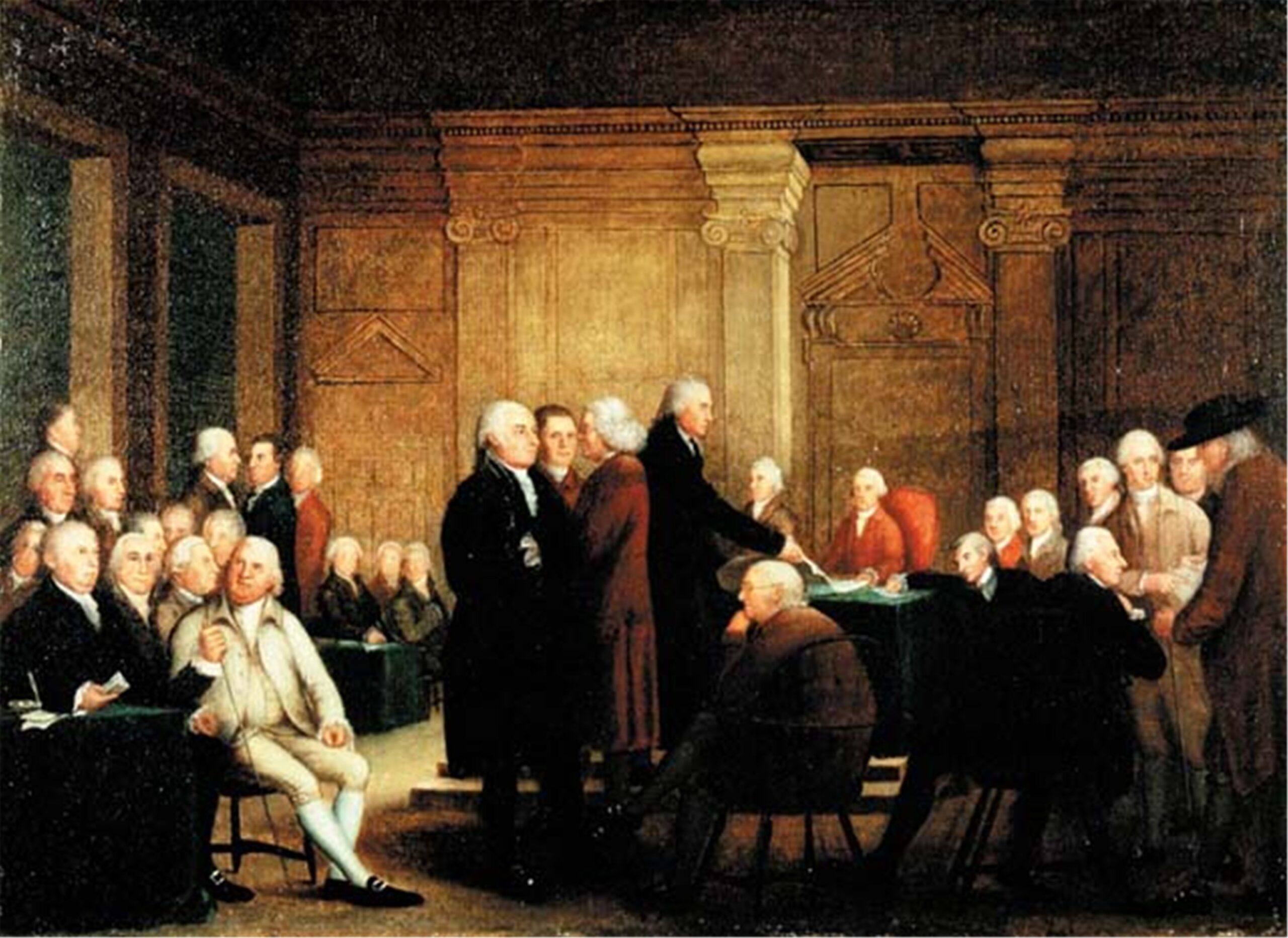The Second Continental Congress passes the “Declaration Setting Forth the Causes and Necessity of Taking Up Arms,” Paragraphs 1, 2, 3, 4, 6, 8, 10, 12, 13 and 14 of which state:
… The legislature of Great-Britain, however, stimulated by an inordinate passion for a power not only unjustifiable, but which they know to be peculiarly reprobated by the very constitution of that kingdom … attempted to effect their cruel and impolitic purpose of enslaving these colonies by violence, and have thereby rendered it necessary for us to close with their last appeal from reason to arms. …
Our forefathers, inhabitants of the island of Great-Britain, left their native land, to seek on these shores a residence for civil and religious freedom. … At the expense of their blood, at the hazard of their fortunes … they effected settlements in the distant and unhospitable wilds of America.
Parliament … have undertaken to give and grant our money without our consent, though we have ever exercised an exclusive right to dispose of our own property; statutes have been passed for extending the jurisdiction of courts of admiralty and vice-admiralty beyond their ancient limits; for depriving us of the accustomed and inestimable privilege of trial by jury, in cases affecting both life and property; for suspending the legislature of one of the colonies; for interdicting all commerce to the capital of another; and for altering fundamentally the form of government established by charter, and secured by acts of its own legislature solemnly confirmed by the crown; for exempting the “murderers” of colonists from legal trial, and in effect, from punishment; for erecting in a neighbouring province, acquired by the joint arms of Great-Britain and America, a despotism dangerous to our very existence; and for quartering soldiers upon the colonists in time of profound peace. It has also been resolved in parliament, that colonists charged with committing certain offences, shall be transported to England to be tried.
… By one statute it is declared, that parliament can “of right make laws to bind us in all cases whatsoever.” …
· · · · · · ·
The [House of L]ords and [House of C]ommons … said, that “a rebellion at that time actually existed within the province of Massachusetts-Bay … Soon after, the commercial intercourse of whole colonies, with foreign countries, and with each other, was cut off by an act of parliament. …
· · · · · · ·
Soon after the intelligence of these proceedings arrived on this continent, general Gage, who in the course of the last year had taken possession of the town of Boston, in the province of Massachusetts-Bay, and still occupied it a garrison, on the 19th day of April, sent out from that place a large detachment of his army, who made an unprovoked assault on the inhabitants of the said province, at the town of Lexington, as appears by the affidavits of a great number of persons, some of whom were officers and soldiers of that detachment, murdered eight of the inhabitants, and wounded many others. From thence the troops proceeded in warlike array to the town of Concord, where they set upon another party of the inhabitants of the same province, killing several and wounding more, until compelled to retreat by the country people suddenly assembled to repel this cruel aggression. …
· · · · · · ·
His [majesty’s] troops have butchered our countrymen, have wantonly burnt Charlestown, besides a considerable number of houses in other places; our ships and vessels are seized; the necessary supplies of provisions are intercepted, and he is exerting his utmost power to spread destruction and devastation around him.
Our cause is just. Our union is perfect. Our internal resources are great, and, if necessary, foreign assistance is undoubtedly attainable. … With hearts fortified with these animating reflections, we most solemnly, before God and the world, declare, that … being with one mind resolved to die [as] freemen rather than to live [as] slaves.
… We have not raised armies with ambitious designs of separating from Great-Britain, and establishing independent states. We fight not for glory or for conquest. …
In our own native land, in defence of the freedom that is our birthright, and which we ever enjoyed till the late violation of it — for the protection of our property, acquired solely by the honest industry of our fore-fathers and ourselves, against violence actually offered, we have taken up arms. We shall lay them down when hostilities shall cease on the part of the aggressors, and all danger of their being renewed shall be removed, and not before.
[updated 11/9/2024]
Subsequent Events:
Authority:
Magna Carta, Chapter 13
ccc-2point0.com/magna-carta-excerpts
Magna Carta, Chapter 61
ccc-2point0.com/magna-carta-excerpts
References:
“Chronology of Events, 1774-1804,” from The Debate on the Constitution, two volumes, Bernard Bailyn, ed., (New York: Library of America, 1992), 2:1028.
Avalon Project – Declaration of the Causes and Necessity of Taking Up Arms
avalon.law.yale.edu/18th_century/arms.asp


